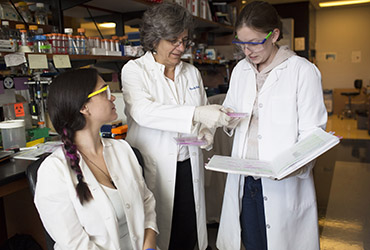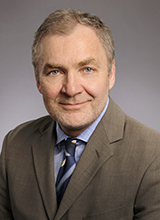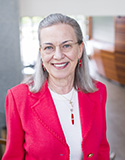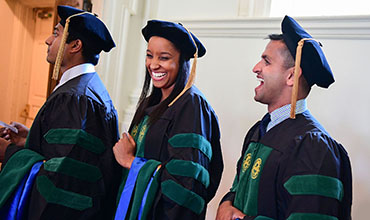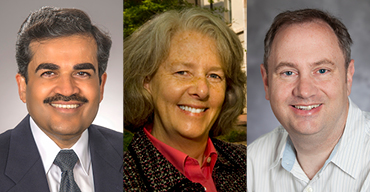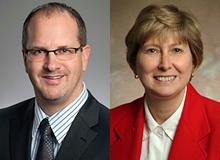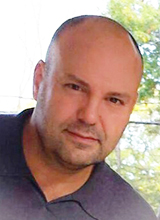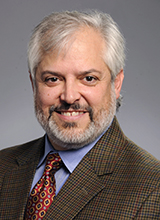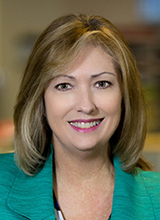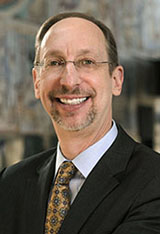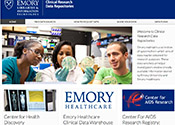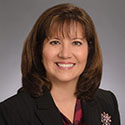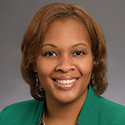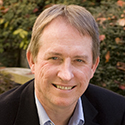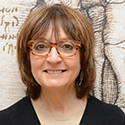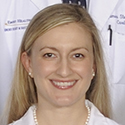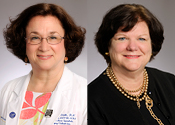
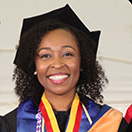
First Emory DNP graduates |

New career path for nonfaculty scientists |
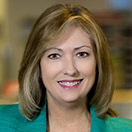
Training in Faith Community Nursing |
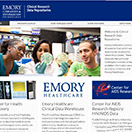 In brief |
|||||
| May 18, 2017 | |||||||||||||||||||||||||||||||||
Winship receives NCI comprehensive designation
Winship Cancer Institute has earned comprehensive cancer center designation from the National Cancer Institute, placing it in the top 1% of all U.S. cancer centers.
The "comprehensive" designation means that Winship has demonstrated that its programs are reducing the cancer burden on Georgia through research in its laboratories, its clinical trial program, and its population-based science. "The NCI designation signifies that Winship's research and education programs are changing the lives of the citizens of Georgia for the better," says Winship Executive Director Walter J. Curran Jr. The new designation was awarded after a rigorous evaluation process conducted by the NCI that included submission of a written grant and a site visit conducted by more than two dozen scientists from peer institutions. During that visit, the review committee watched videotaped remarks from former President Jimmy Carter supporting Winship's application. He said: "I never knew that my own life would be saved by research that was funded through the NCI and its program that laid the foundation for such centers as Winship. Recently, I needed the very care that I have advocated for, care that exists through NCI's cancer center program." Winship earned its first NCI cancer center designation in 2009, and the grant was renewed in 2012. Established 80 years ago by a foundational gift from Robert W. Woodruff, Winship continues to receive funding support from the Robert W. Woodruff Health Sciences Center Fund, Inc. "Winship is fulfilling Robert Woodruff's vision of a world-class cancer center," says Curran. Read more.
Monday, May 8, was a day of celebration for more than 1,100 graduates in the schools of nursing, public health, and medicine. The SON awarded its first DNP degrees, seven in all, including one to nursing instructor Alexandra Finch. The school also granted five PhD, 107 BSN, 35 accelerated BSN, 131 MSN, and 47 accelerated MSN degrees. More than 40% of its graduates had participated in service learning/global health experiences, with the graduating class providing more than 25,000 hours of community care to more than 9,000 people worldwide.
The RSPH had 541 graduates, granting 32 PhDs and 509 MPH or MSPH degrees, including 29 dual degrees with business, theology, nursing, and medicine (MD, physical therapy, and physician assistant). The graduates, 80% of whom were women, came from 36 states and 25 countries and ranged in age from 22 to 64. Faculty member Carol Hogue (epidemiology) received the university's Thomas Jefferson Award.
In addition to 71 graduates in physical therapy, nine in genetic counseling, and 50 in medical imaging, the SOM had 134 MD graduates, including 33 who received dual PhD, MPH, MSC, MBA, or JD degrees. The graduation speaker was RSPH Emeritus Presidential Distinguished Professor of International Health William Foege.
A new career path for scientists
Christopher Raymond joined the Mouse Transgenic and Gene Targeting Core as associate director in early 2016 and was promoted to core director this past March, his advancement made possible by a new career track for non-faculty PhD biomedical scientists. The new track has four position levels: assistant scientist, associate scientist, scientist, and senior scientist. A similar track is available for non-faculty PhDs in bioinformatics. Both tracks support research and professional growth as envisioned by their creators, Michael Zwick, assistant VP for research (WHSC), and Trish Haugaard, assistant dean for research administration (SOM).
Emory is among the leading research institutions offering such positions, addressing a workforce issue raised by the NIH, the National Academy of Sciences, and other universities some years ago. The issue: There aren't enough faculty positions available for PhD-prepared scientists, and there are few advancement opportunities for non-faculty scientists in academic research. When postdoctoral fellows complete their training, they often land in low-level jobs with no promotion path or take jobs in other sectors. "We need career-minded scientists—in industry, government, and academia," says Zwick. "We need them at Emory to work in our core labs and in labs run by faculty. Providing a path for career and professional development helps us recruit and retain these highly skilled individuals at Emory." The Emory Integrated Core Facilities [EICF] have hired three staff scientists thus far and plan to hire more in both career tracks. "A lot of scientists who earn PhDs don't want to live in the publish-or-perish world," says Haugaard. "They love the science work. They are the engine that keeps their team running." The positions she and Zwick developed are well suited to the EICF's 15 core labs, which Zwick leads. Each one of these cores provides highly specialized services for researchers in and outside the university. "The core labs are knowledge centers that cut across silos," Zwick says. "If an EICF staff scientist has solved a problem for one investigator, the solution may be useful for other investigators. We never want to solve a problem more than once. We want our staff scientists to foster more interaction among labs, take over daily management tasks, and provide our scientific adviser faculty members greater time to consider strategic goals and pursue their individual research." Before Raymond was hired to direct the transgenic mouse core, Tamara Caspary (associate professor, human genetics) spent up to 50% of her time running the core—well above the 20% officially allotted for the task. Running the core took precious time away from running her own laboratory, where she studies genetic defects affecting central nervous system development and writing grants to support her research. Now Caspary devotes 5% of her time to the core as scientific adviser and leaves the rest to Raymond and three staff members. "He has freed up my time to think strategically about the core and not focus on the day-to-day operations," says Caspary. "It lets us think about the big picture. I'm able to go out and talk to investigators and see what's coming on the horizon and how we can change our core services to meet their needs."
As core director, Raymond oversees a service center that handles about 100 projects annually. This year, about 20 projects will be run on the CRISPR-Cas9 platform. CRISPR saves time by allowing scientists to edit genes directly in mouse embryos versus developing mutant mouse strains from stem cells. "It's been a good change for me," says Raymond, an embryologist who previously worked for Merck pharmaceuticals in New Jersey. "There are a lot of positives about working in industry, but this position gives me more freedom to make decisions." The new career track dovetails with an NIH-funded program called BEST (Broadening Experiences for Scientific Training) that prepares scientists for jobs outside the faculty track. Thus far, about 100 trainees, 25 per year, have completed BEST, a joint program between Emory and Georgia Tech.
"A large fraction of trainees love doing research but don't want to write grants, serve on committees, and assume other responsibilities that come along with tenure-track faculty positions," says Nael McCarty, Marcus Professor of Cystic Fibrosis and BEST director. "When we asked Dr. Zwick to talk to our trainees, they were excited to hear about positions outside the faculty track. "We need positions for people who are no longer trainees so they earn a real living wage to raise families on. We need to have scientists in the workforce, other than predocs and postdocs, to keep our labs going."—Pam Auchmutey 140 nurses complete Faith Community Nursing inaugural class
Last month, 140 nurses from throughout Emory Healthcare attended a six-day, 50-hour course at Emory Saint Joseph's Hospital and became the first to be commissioned in Emory Healthcare's new Faith Community Nursing Program. Developed by Rebecca Heitkam, faith community nursing coordinator and specialty director of Congregational Health Ministries at ESJH, the program aims to improve access to care in the community, expand awareness of healthy behaviors, provide educational programs, and focus on preventive care and disease management. "Many of the nurses in our program have volunteered in their community churches for years, and this is a chance to combine their professional experience with something they are passionate about," says Heitkam. "Our objective is to support health and healing in partnerships with communities of all faith traditions." Faith community nurses will teach classes or conduct accountability programs in partnership with faith congregations or community centers. This includes teaching participants how to choose healthy lifestyle behaviors instead of those that contribute to diabetes, heart disease, obesity, and cancer. Faith community nurses will also assist with Emory Healthcare-sponsored health screenings and wellness events. During the next year, the nurses will complete a portfolio of their community work in order to earn board certification from the American Nurses Credentialing Center. Heitkam plans to expand the program with a one-on-one nurse/patient navigation program. Nurses will be assigned one patient to assist with their complex or chronic medical conditions, all done in collaboration with the patient's Emory Healthcare provider. The nurses will call their assigned patients two to three times per week, assisting with symptom management and navigation of their health care journey. "One preventive call could significantly reduce the number of emergency room visits or readmissions to the hospital," says Heitkam. Read more. |
| From the Executive VP
Congratulations on lifesaving work
Here in Georgia, cancer patients and their families have a rare and wonderful resource in the Winship Cancer Institute. How rare? According to the National Cancer Institute, Winship falls within the top 1% of all cancer centers nationwide. As a result, NCI has awarded Winship the elite comprehensive cancer center designation. This prestigious recognition comes after a rigorous and highly competitive review process, and it reflects Winship's tangible impact on people facing cancer in our state. Indeed, Winship is the only institution of its kind in Georgia. It has become the state's epicenter of cancer research, education, and care. Winship's patients have access to the most advanced diagnostic and treatment procedures being performed anywhere in the world, which translates to the ultimate achievement: saving and improving patients' lives. Congratulations to Dr. Wally Curran and to all the faculty, staff, supporters, and friends whose talent, commitment, and compassion drive Winship's lifesaving work.
Accessing Emory data for clinical research
Finding data for research studies recently got easier with the launch of the Emory Clinical Research Data Repositories website, which includes information on accessing data from the Emory Healthcare Clinical Data Warehouse, Center for AIDS Research, Atlanta VA Medical Center, Grady Hospital, and the Center for Health Discovery and Wellbeing. The website grew out of an initiative started several years ago (One IT) to combine the information technology resources of Emory University and Emory Healthcare. While working on One IT, Jeff Weaver, director of IT Data Solutions, and his colleagues in data analytics discovered that Emory researchers didn't know where to go or how to access clinical data for their studies. "All the data was already out there, but people didn't know how to get it," he says. The site informs researchers of the vast sources of data that are available and how to request it. If needed, Weaver and his team can extract the requested data and provide it directly to researchers. "I urge anyone who is interested in publicizing his or her data to the Emory community to contact me so that I can add it to the database," he says. CFAR receives NIH funding renewal
Emory's Center for AIDS Research (CFAR) received a five-year, $10 million NIH award to further its work in decreasing HIV incidence, improving the well-being of infected individuals, training the next generation of researchers and clinical leaders, and seeking a vaccine and cure for HIV. Part of a national network of 20 universities supported by the NIH, CFAR provides support to enhance and coordinate HIV/AIDS research and supports development of early career investigators pursuing HIV/AIDS research. CFARs compete for funding renewal every five years. Read more. Appointments
Victoria Jordan is the new corporate director of quality at Emory Healthcare and director of performance improvement and analytics for the James Cox Kennedy Initiative for Patient-Centered Care. As corporate director for quality, she will develop, plan, coordinate, and implement quality clinical improvement efforts across Emory Healthcare. In the latter title, a new role, Jordan will lead the effort to define and operationalize the vision of expanding performance improvement, while providing quality education and training to staff. Jordan came to Emory from M.D. Anderson Cancer Center, where she was executive director of strategic management and systems engineering. Read more.
Christy Norman has been named VP of pharmacy services at Emory Healthcare. Norman comes to Emory from Augusta University Medical Center, where she held the positions of administrative director of pharmacy and director of pharmacy residency programs. She is also a clinical assistant professor at the University of Georgia College of Pharmacy. Read more.
Psychiatrist Charles Raison has been appointed director of research in Spiritual Health, an office led by George Grant. Notable
Suman Kang is one of 12 Winship researchers who recently received pilot grants through Winship Invest$, a peer-reviewed program designed to fund innovative research projects at Winship. Read more.
Neuroscientist Helen Mayberg was recently elected to the American Academy of Arts and Sciences. Read more.
Amy Simone has been elected to serve as president of the Association of Physician Assistants in Cardiology. Read more.
Two Emory Healthcare nurses, Mary Still and Mary Zellinger, have been inducted as fellows into the American College of Critical Care Medicine. Read more. Calendar June 1: 10th Emory Quality Conference. Posters and workshops 2 - 4 p.m., in Cox Hall and SOM and 3 - 4 p.m., at other locations. Main conference takes place 4:30 to 7 p.m., Cox Hall, third floor ballroom. The conference will be broadcast to EUH, EUH Midtown, ESJH, EJCH, EUOSH, and Grady. June 30: Application deadline for the third cycle of the WHSC Synergy Awards to support new collaboration projects among WHSC schools, centers, and faculty. Oct 14: 7th annual Winship Win the Fight 5K. More info.
|

